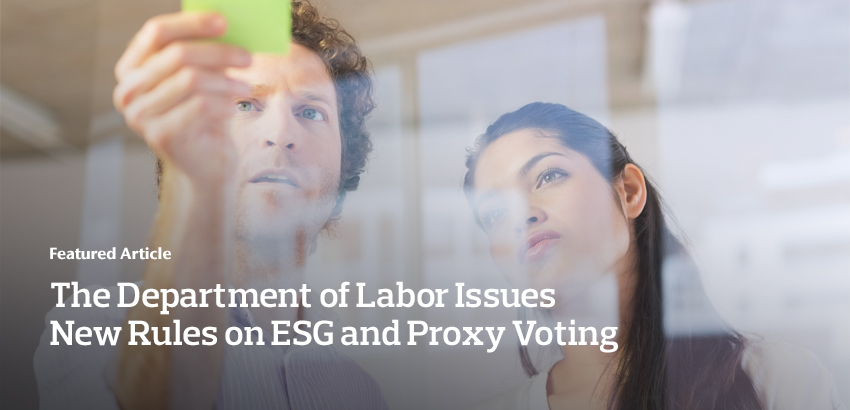Aon | Financial Services Group
The Department of Labor Issues New Rules on ESG and Proxy Voting
Release Date: March 2023 On November 22, 2022, the U.S. Department of Labor (DOL) released its final rule in which the DOL: (i) clarifies the extent to which plan fiduciaries may consider Environmental, Social, and Governance (ESG) factors when selecting investments, and (ii) strengthens proxy voting oversight.
The final rule becomes effective January 30, 2023, except for certain parts affecting proxy voting, which will take effect on December 1, 2023, so that fiduciaries and investment managers have time to prepare.
The Final Rule Removes Barriers to Considering ESG Factors
In its press release announcing the final rule, the DOL commented that prior rulemaking “unnecessarily restrained plan fiduciaries’ ability to weigh ESG factors when choosing investments, even when those factors would benefit plan participants financially.”1 The final rule removes such restraints, and provides that “[r]isk and return factors may include the economic effects of climate change and other environmental, social, or governance factors”.2 Although plan fiduciaries may take the risk-return effects of ESG factors into consideration, the final rule does not require that they do so.
Consistent with the duty of prudence required by the Employee Retirement Income Security Act of 1974, as amended (ERISA), fiduciaries “may not sacrifice investment return or take on additional investment risk to promote benefits or goals unrelated to the interests of participants and beneficiaries in their retirement income or financial benefits under the plan.”3 The final rule provides that a fiduciary may consider collateral benefits other than investment returns if the fiduciary concludes that “competing investments, or competing investment courses of action, equally serve the financial interests of the plan over the appropriate time horizon.”4
The final rule further provides that plan fiduciaries do not violate ERISA’s duty of loyalty “solely because they take participant preferences into consideration” when constructing a menu of prudent investment options for participant-directed 401(k) plans.5 In fact, the DOL commented that doing so may result in greater participation or higher deferral rates, leading to greater retirement security and furthering the purposes of the plan. Yet, fiduciaries “may not add imprudent investment options to menus based on participant preferences or requests because that would violate ERISA’s duty of prudence.”6
The Final Rule Strengthens Proxy Voting Oversight
The final rule also affirms that the duty to manage plan assets includes proxy voting and provides that proxies should be voted unless imprudent to do so. Fiduciaries need to exercise prudence and diligence in monitoring the approach to proxy voting.7
Impact of the Final Rule on Fiduciary Liability Insurance
Based on discussions with insurers, Aon believes that the final rule is unlikely to have any immediate impact on the availability and scope of Fiduciary Liability insurance for public and private companies, as the DOL merely clarified that “ESG factors are no different than other non-ESG relevant risk-return factors.”8 The final rule is in stark contrast to what some industry experts predicted would be a “de facto mandate” in favor of ESG, which insurers feared may have given rise to litigation.
Notably, the final rule does not apply to governmental plans which are not governed by ERISA. Given the current contentious political environment towards ESG investments, particularly between red and blue states, Fiduciary Liability insurers have raised concerns that litigation may arise particularly if such investments perform poorly.
Response from Congress
In late February and early March 2023, both houses of Congress passed resolutions - largely on party lines - to overturn the final rule. On March 20th President Biden vetoed the legislation, and on March 23rd an attempt by House Republicans to override the President’s veto failed to obtain the necessary two-thirds majority vote.
Contact
If you have questions about your coverage or are interested in obtaining coverage, please contact your Aon broker. This article can be discussed with Financial Services Group professional Jay Desjardins.

Jay Desjardins
Managing Director, Deputy National Practice Leader
Radnor
1 - “U.S. Department of Labor Announces Final Rule to Remove Barriers to Considering Environmental, Social, Governance Factors in Plan Investments”, US DOL News Release (November 22, 2022)
2 - “Prudence and Loyalty in Selecting Plan Investments and Exercising Shareholder Rights”, Employee Benefits Security Administration, 87 Federal Register 73822 (December 10, 2022)
3 - Id. at 73885 (emphasis supplied)
4 - Id. at 73885
5 - Id. at 73860 (emphasis supplied)
6 - Id. at 73878 (emphasis supplied)
7 - Id. at 73885
8 - Id. at 73854
This document is not intended to provide, and shall not be relied upon for, accounting, legal or tax advice or investment recommendations. Any accounting, legal, or taxation position described in this presentation is a general statement and shall only be used as a guide. It does not constitute accounting, legal, and tax advice and is based on Aon Investments’ understanding of current laws and interpretation.
This document is intended for general information purposes only and should not be construed as advice or opinions on any specific facts or circumstances. The comments in this summary are based upon Aon’s preliminary analysis of publicly available information. The content of this document is made available on an “as is” basis, without warranty of any kind. Aon disclaims any legal liability to any person or organization for loss or damage caused by or resulting from any reliance placed on that content. Aon reserves all rights to the content of this document. No part of this document may be reproduced, stored, or transmitted by any means without the express written consent of Aon.

